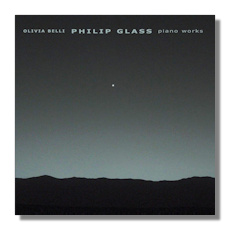
The Internet's Premier Classical Music Source
Related Links
- Glass Reviews
- Latest Reviews
- More Reviews
-
By Composer
-
Collections
DVD & Blu-ray
Books
Concert Reviews
Articles/Interviews
Software
Audio
Search Amazon
Recommended Links
Site News
 CD Review
CD Review
Philip Glass

Piano Works
- Night on the Balcony (From "The Screens")
- Etude #5
- The Poet Acts (From "The Hours")
- Opening from "Glassworks"
- Etude #9
- Metamorphosis Two
- Choosing Life (From "The Hours")
- Etude #2
- Modern Love Waltz
- Wichita Vortex Sutra
- Truman Sleeps (From "The Truman Show")
Olivia Belli, keyboard
Recorded: October, 2017
Olivia Belli CD 59:48
This release may go unnoticed by most listeners who might have an interest in the repertory. Why? Well, the reader may have observed that the recording has been issued on the pianist's own label, and she is not a particularly well known performer and thus does not have the means to market her product the way the better known labels would. If it ends up largely neglected by the public and critics, that would be a shame, because the music and performances on this CD are quite worthy of attention to the many Philip Glass admirers. Even those with an interest in modern music who haven't yet familiarized themselves with his music, may find this disc of considerable interest. Let me now give a little background on the composer for the uninitiated.
Philip Glass has etched out one of the more recognizable and distinctive styles of this or any period in music history. You can quickly identify it in a work even when he's not the composer: he is often imitated by others, not only in the serious music vein but in other genres as well. He has steadily risen over the years: there was a time when you heard his name mentioned in the company of La Monte Young, Steve Reich and Terry Riley – mentioned in a way to suggest they are somehow equals – but he has long since separated himself from them and stands with – but probably above – John Adams as the leading composer of so-called minimalist composition. Actually, Glass refers to his works as "music with repetitive structures," but I'm not sure that rules out the term "minimalism" in any significant way.
At any rate, he is a composer who will likely go down as one of the most important of his generation. Some will argue that he possesses the mark of genius: in many ways his music rises above his style; it becomes him, becomes a personality, not a set of traits that musicologists identify as fitting into a particular category. Yes, you can place him in a category, but a category he helped to found and one he brought from the sidelines into the mainstream.
Well, here is a disc of his keyboard works that in the album notes Italian pianist Olivia Belli declares to be a tribute to Glass. She employs a midi keyboard using UNA CORDA, from Native Instruments software. I believe the keyboard is actually a Yamaha, the instrument she uses in several Glass performances on YouTube. The UNA CORDA tone is softer than a piano's and is based on the idea of employing one string per note. At any rate, the sound produced is quite appropriate to the music, though I imagine a standard piano, preferably a Steinway, would also serve the works quite well.
Night on the Balcony is a Chopinesque piece of mesmerizing character and it comes across quite convincingly in its dark mood here. Not that it is imitative of Chopin, but the Prelude in E minor (#4, from Chopin's Op. 28) came almost immediately to mind when listening to this. While the styles of the two composers are quite different to be sure, they seem to share a similar spirit, not just in this piece but in several here. The rather static and also quite dark Etude #5 strikes me as too ponderous, though I can't blame the pianist because her tempo is rather standard in this work. The whole thing is skeletal, thread-bare in its sonorities and in a reversal of the alleged charge made in the Amadeus movie, there just seem to be too few notes – too little going on – to hold one's interest. Glass mavens will likely disagree.
The Poet Acts is somewhat in the same mould but shorter and quite haunting in its rhythms and repetitions, sounding typically Glassian and conveying the sense the piece is a classic of sorts. Opening reminds me of echoes, its notes striking the ear and mind as a sort of Impressionistic take on reverberating sounds. It's also quite hypnotic, though repeated hearings might make you think it overstays its welcome a bit. Etude #9 is among the livelier pieces here, offering effective contrast to the generally slower and darker works that are predominant on the disc. That said, though it is quite colorful, its sense of anxiety also yields a darker character.
I could continue with this blow by blow description of the remaining pieces on the CD, but let me sum them up thusly: the best of them – and they are all pretty good – are Wichita Vortex Sutra, with its imaginative conflation of hymn-like solemnness and jazziness, and vibrant, colorful rhythmic patterns; and Etude #2, with its delicate upper notes and ominous potent lower ones that etch out the thematic material in a way full of subtle contrasts. The performances by Olivia Belli are consistently excellent, as fine as I've heard in this kind of repertory. The sound reproduction is good. As suggested above, you can view several complete performances of these pieces by Ms. Belli on YouTube. In sum, if Glass is your cup of tea, then you certainly won't be disappointed by this fine, but under the radar, disc.
Copyright © 2018, Robert Cummings


















